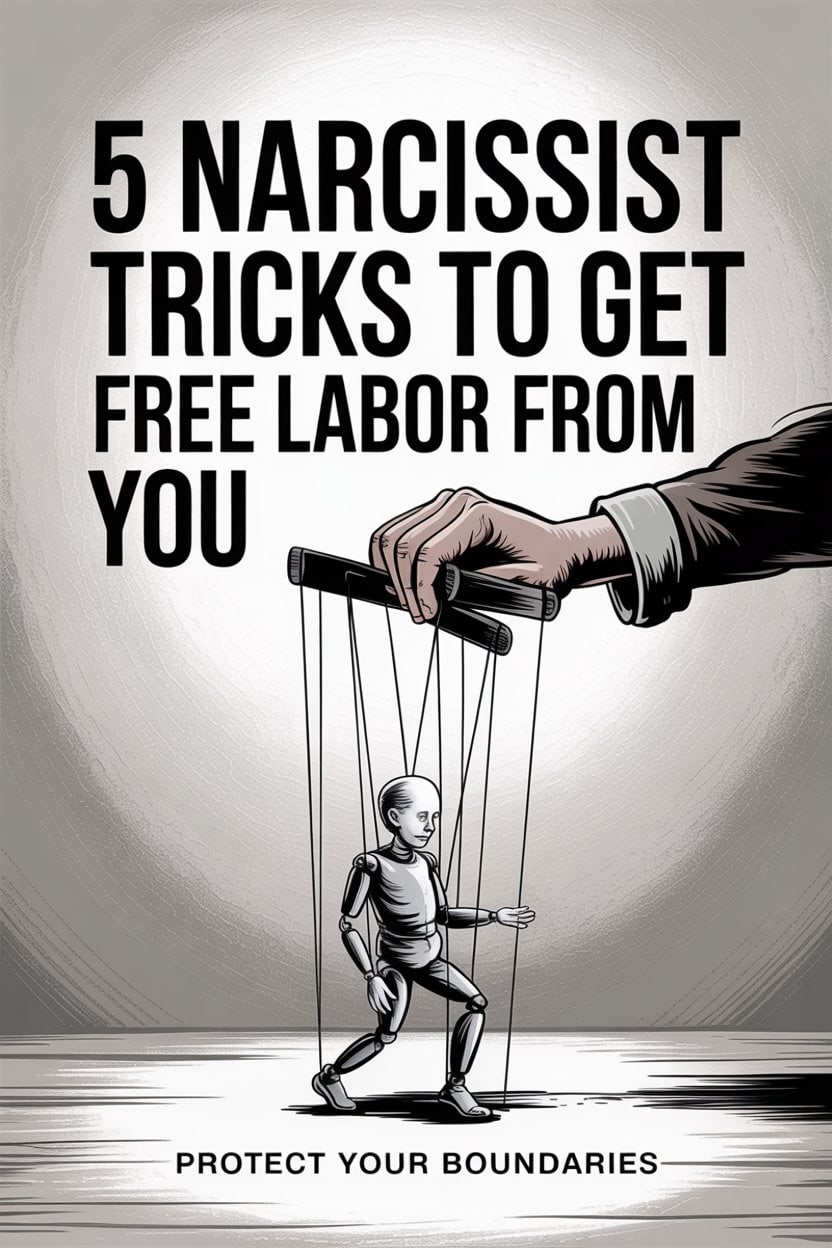Ever found yourself knee-deep in someone else’s dirty dishes, garden weeds, or soul-crushing spreadsheets, only to wonder, “Wait, how did this become my job?”
If yes, congratulations—you may have experienced the Olympic-level manipulation skills of a narcissist on the prowl for free labor.
The bad news: it wasn’t a coincidence. The good news: once you spot these tricks, you’re halfway to dodging them like a pro.
Let’s pull back the curtain and see exactly how these masters of self-interest rope everyone into their to-do lists, all while making it look like your idea.
1. The Flattery Trap
There’s nothing quite like the sweet, ego-tickling aroma of flattery from a narcissist. They’re the Willy Wonka of compliments, serving up golden tickets that look irresistible.
“No one organizes files like you do.” “You’re such a natural with event planning.” “Honestly, nobody makes coffee quite like yours.” Before you know it, you’re alphabetizing their receipts or running their weekend bake sale.
But here’s the secret ingredient: this praise isn’t about you. It’s bait. The narcissist’s version of a help-wanted ad. They stroke your ego with the precision of a petting zoo handler, then slide in the request.
You feel special, competent, indispensable. Who wouldn’t say yes?
What to do instead? Next time someone serves you a piping hot compliment followed by a “casual” favor, pause. Ask yourself: is this really recognition, or just a velvet-gloved request?
It’s absolutely okay to say, “Thanks, but I’ve got too much on my plate.” If your main character moment doesn’t include being their unpaid intern, don’t be afraid to pass.
2. The Victim Symphony
If there were Oscars for emotional performance, narcissists would need a separate shelf. Few people can compose a symphony of sighs, elaborate tales of woe, and existential exhaustion quite like they can.
“I’ve just been so overwhelmed lately. Nobody helps me. Everything’s on my shoulders. It must be nice to have a break.” Cue the violin section.
The trick here is emotional blackmail by way of guilt. They transform you into the only person who can save them from their tragic fate—by doing their chores, covering their shift, or handling their paperwork.
If you say yes, you’re the hero; if not, you’re cold-hearted and selfish.
Spotting this trick means learning to separate genuine need from manufactured crisis. Compassion is wonderful, but if this person’s “emergencies” are a daily occurrence, you’re probably being played.
Try offering emotional support without signing up for another unpaid shift. “That sounds tough. I hope things ease up for you soon.” Period. No sign-up sheet attached.
3. The Faint Praise Gambit
Narcissists have a sixth sense for making you doubt your worth—right before offering you a chance to prove yourself.
It starts with a subtle dig or a backhanded compliment: “You’re not really detail-oriented, but I guess you could try sorting these files for me.” Or, “I know you haven’t done this before, but everyone else is busy.”
Why does this work? The urge to prove someone wrong—especially when your competence is being questioned—can be irresistible. Suddenly, you’re pulling an all-nighter to show you’re not, in fact, hopeless.
And just like that, they’ve collected another round of free labor, all in the name of your pride.
Here’s the trick: it’s not your job to prove anything to someone who questions your skills just to get you to work for free. A little self-awareness goes a long way.
Try: “I’m comfortable with my abilities, thanks. I’ll pass.” Or, even better, let them find someone else to handle their busywork.
4. The Friendship Façade
Nothing says “friendship” quite like a narcissist who only calls when their moving van pulls up. These are the mates who always need a lift, a hand, or a wallet at the ready—but somehow disappear when it’s your turn for help.
The friendship façade trick works because most people want to be good friends. The narcissist leans hard on that social glue: “You’re such a great friend, I knew I could count on you!”
There’s a sticky sense of obligation attached, and before you know it, you’re painting their fence on your one day off.
Want to flip the script? Stop volunteering for the “friendship Olympics.” Friendship is a two-way street, not a free labor toll road.
If you notice a pattern where your so-called pal goes MIA when the tables are turned, it’s time to set boundaries. Try: “I’d love to help, but I have plans.” Watch how quickly the friendship energy shifts.
5. The Disappearing Act
When tasks get tough or messy, narcissists have an uncanny ability to vanish faster than your paycheck on rent day. The family barbecue needs cleaning up?
Suddenly, they’re too busy taking an important call. Major project at work? “Oh, didn’t you get the memo? I’m double-booked!”
The disappearing act leaves you holding the bag—every single time. The hope, of course, is that you’ll pick up the slack, and they’ll swoop back in once the hard part’s over, ready for applause.
It’s a trick straight out of the Houdini playbook, minus the top hat.
Resisting this one means not automatically stepping in. When your favorite magician is nowhere to be seen, resist the urge to clean up their mess.
If the task is communal, speak up: “Looks like we’re missing a few hands here. I’ll wait until everyone’s back.” Magic trick, ruined.
Spotting the Patterns and Reclaiming Your Time
Recognizing these tricks is half the battle. The other half? Sticking to boundaries like your sanity depends on it—because, let’s face it, sometimes it does.
Narcissists are skilled at making their needs feel urgent, special, and irresistible. But nobody’s value is measured by how many favors they can rack up for someone else.
Reclaiming your time means getting comfortable with “no,” “not now,” and “I’ve got my own stuff.”
If you need a permission slip, here it is: You don’t owe anyone free labor just because they’re charming, needy, or related to you by blood, marriage, or the world’s most questionable friendship.
If all else fails, remember: narcissists are always searching for the next willing helper.
Once you stop playing, they’ll move on to another audience. Enjoy the show—from a safe distance.


